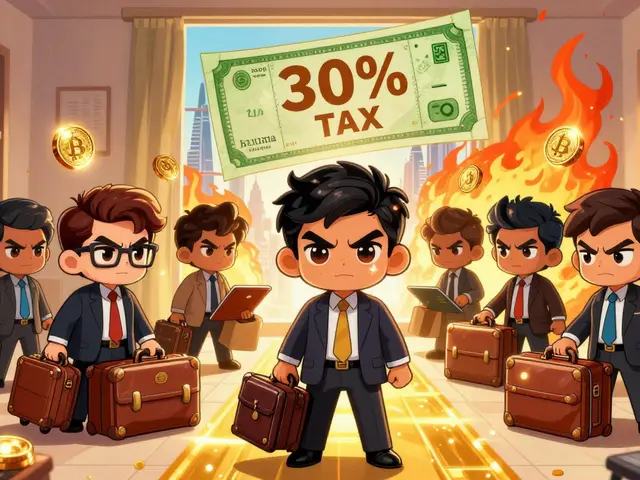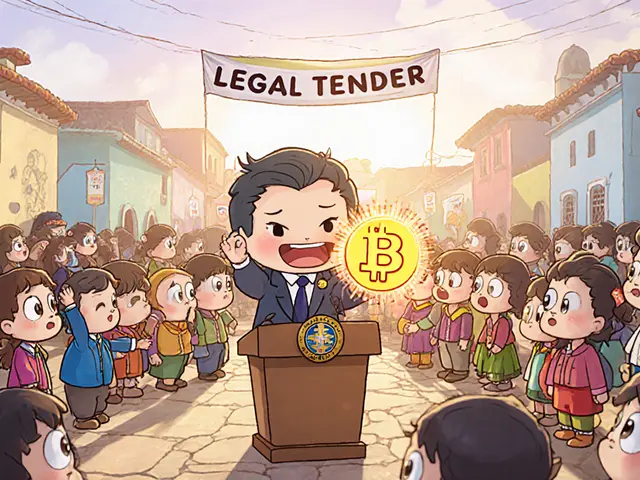Iran DEX Access Planner
Follow these steps to access decentralized exchanges safely in Iran:
- Secure Connection: Use a VPN with obfuscated servers (e.g., Mullvad, ProtonVPN) to mask your IP address.
- Wallet Setup: Install a non-custodial wallet like MetaMask, Trust Wallet, or Rainbow.
- Network Selection: Move assets to low-fee chains like Polygon or Binance Smart Chain.
- Stablecoin Strategy: Convert USDT to DAI for better resilience against freezes.
- Aggregator Use: Use DEX aggregators like 1inch to find optimal routes.
| DEX | Chain | Gas Cost | KYC Required |
|---|---|---|---|
| Uniswap | Ethereum | $3-$5 | No |
| SushiSwap | Polygon | $0.01-$0.03 | No |
| PancakeSwap | Binance Smart Chain | $0.05-$0.10 | No |
| 1inch | Multi-chain | Varies | No |
Estimate your risk level based on your DEX usage pattern:
Your Risk Assessment
- Split large holdings across multiple wallets
- Use privacy-enhancing tools like mixers (where available)
- Stay updated on OFAC sanctions list
- Maintain a minimal KYC footprint
- Record all swaps for tax purposes
Iranian crypto fans are stuck between heavy sanctions and a crackdown on local platforms. The big question is: can you still trade on a Decentralized exchange (DEX) a peer‑to‑peer trading venue that runs on smart‑contract code without a central authority without getting flagged by the Central Bank?
The answer is yes-if you know the right networks, tools, and legal gray zones. Below we break down the regulatory backdrop, the DEXs that actually work for Iranian users, and a step‑by‑step playbook to stay on the right side of the law while keeping your crypto flowing.
Regulatory Landscape in 2025
In January 2025 the Central Bank of Iran (CBI) the state authority that now oversees every crypto activity, from mining to trading made a sweeping move: every individual or business dealing with digital assets must obtain a license and hand over transaction data. The bank can see every on‑chain address linked to an Iranian IP, making traditional exchanges risky.
July 2025 saw the biggest freeze ever by Tether the issuer of the USDT stablecoin, which froze 42 Iran‑linked addresses. Half of those wallets were tied to Nobitex Iran's dominant centralized exchange handling 87% of local crypto volume, and many routes led to IRGC‑affiliated accounts.
That freeze pushed traders toward cheaper, faster networks. A massive swap from USDT to DAI a USD‑pegged stablecoin created by MakerDAO on the Polygon network a Layer‑2 scaling solution for Ethereum offering low fees became the de‑facto safety valve.
August 2025 added a new layer: the Law on Taxation of Speculation and Profiteering now taxes crypto gains like gold or forex. While the tax code is still being rolled out, the mere classification signals Tehran's intent to treat digital assets like any other financial instrument.
Why DEXs Matter for Iranians
- No single point of failure: Unlike Nobitex, a DEX can’t be shut down with a court order.
- Cross‑border liquidity: You can tap global pools on Ethereum, BSC, or Polygon without a local fiat bridge.
- Lower surveillance risk: Trades settle on‑chain; the CBI can see an address but not the intent behind each swap.
That said, DEXs aren’t a magic bullet. The CBI could still demand KYC from any service that requires a wallet login, and using a VPN to hide your IP may raise red flags if the bank audits your internet logs.

Practical Tools to Reach a DEX
- VPN or Proxy: Choose a reputable provider that offers obfuscated servers (e.g., Mullvad, ProtonVPN). This masks your Iranian IP and lets you reach geo‑blocked front‑ends.
- Non‑custodial wallet: Metamask, Trust Wallet, or the open‑source Rainbow a mobile‑first Ethereum wallet that never stores private keys on a server are ideal because they don’t require KYC.
- Bridge to a low‑fee chain: Use the Polygon Bridge or the Binance Smart Chain bridge to move assets from Ethereum’s mainnet to a cheaper network.
- Stablecoin choice: Swap USDT for DAI on Polygon before hitting a DEX. DAI’s decentralized backing makes it less likely to be frozen.
- DEX aggregator: Platforms like 1inch a multi‑chain router that finds the best price across many DEXs bundle routes, reducing the number of clicks and exposure.
Top DEXs That Work From Iran (2025)
| DEX | Primary Chain | Typical Gas Cost (USD) | KYC Requirement | Access Method |
|---|---|---|---|---|
| Uniswap | Ethereum | ~$3‑$5 | No | Metamask + VPN |
| SushiSwap | Polygon | ~$0.01‑$0.03 | No | Trust Wallet + VPN |
| PancakeSwap | Binance Smart Chain | ~$0.05‑$0.10 | No | MetaMask + VPN |
| 1inch | Multi‑chain (ETH, BSC, Polygon) | Varies by route | No | any non‑custodial wallet + VPN |
All four platforms run open‑source smart contracts, so the CBI can’t shut them down. The key is to stay on a low‑fee network (Polygon or BSC) to keep transaction costs low enough that you don’t expose large sums on a single chain.
Step‑by‑Step Guide: Swap USDT → DAI → Trade on SushiSwap (Polygon)
- Install a VPN, connect to a server in Europe or North America.
- Download Trust Wallet from the official app store. Set a strong password and write down your seed phrase.
- Send your USDT from a custodial exchange (or a peer) to your Trust Wallet address.
- Open the built‑in DEX inside Trust Wallet, select the Polygon network, and trade USDT for DAI. Expect a 0.1‑0.3% fee.
- Launch the external DEX interface at app.sushi.com, choose "Connect Wallet", and pick Trust Wallet (via WalletConnect).
- Swap DAI for the token of your choice (e.g., ETH, MATIC, or a DeFi LP token). Confirm the transaction-gas will be a few cents.
- To cash out, use a peer‑to‑peer OTC platform that accepts DAI on Polygon, or bridge DAI back to Ethereum and sell on a peer‑to‑peer market.
Keep transaction logs in a secure, offline folder. If the CBI ever asks for proof of funds, you can show a legitimate OTC receipt without revealing the DEX trade details.

Risk Management and Compliance Tips
- Limit exposure per address: Split large holdings across three or more wallets. This makes it harder for a single freeze to cripple you.
- Use privacy‑enhancing tools: Consider mixing services like Tornado Cash (if still operational) on Polygon to obscure transaction trails.
- Stay updated on sanctions: The OFAC U.S. Treasury's Office of Foreign Assets Control, which enforces sanctions on crypto actors regularly updates its list. Avoid any address flagged there.
- Maintain a minimal KYC footprint: If you must use a service that asks for ID, create a separate legal entity abroad (e.g., a UAE offshore company) to keep your personal identity out of the blockchain.
- Tax reporting: Record every swap as a taxable event under the 2025 law. Use a spreadsheet to track acquisition cost, sale price, and holding period.
Future Outlook: Will DEXs Stay Viable?
The Iranian government is clearly trying to rope crypto into its formal financial system, but the demand for border‑less value transfer isn’t disappearing. As long as Layer‑2 solutions keep fees low and privacy tools evolve, DEXs will remain the most resilient path for Iranian traders. Watch for two trends:
- Regulatory tech: Expect the CBI to develop on‑chain analytics to flag wallet clusters. Using mixers and multi‑address strategies will become essential.
- Cross‑chain bridges: New bridges (e.g., Arbitrum‑Polygon) will let you hop between networks without moving tokens back to Ethereum, reducing exposure to any single chain’s surveillance.
Bottom line: the DEX ecosystem is flexible enough to adapt, but you need a solid operational playbook and a habit of staying one step ahead of regulators.
Frequently Asked Questions
Can I use a DEX without a VPN in Iran?
Technically you can, but Iranian ISPs often block DEX front‑ends and the CBI monitors traffic. A reliable VPN hides your IP and reduces the risk of a forced account freeze.
Is swapping USDT to DAI on Polygon safe from future freezes?
DAI is decentralized and isn’t issued by a single company, so it’s less likely to be frozen. However, the CBI could still target the address if it detects large, repeated inflows.
Do I need to pay Iranian taxes on DEX trades?
Yes. The 2025 tax law treats crypto gains like any other speculative asset. Record each swap, calculate the capital gain, and report it on your annual filing.
Which DEX has the lowest fees for Iranian users?
On Polygon, SushiSwap and 1inch routes typically cost pennies per trade. BSC’s PancakeSwap is also cheap, but be aware of occasional network congestion.
What’s the biggest legal risk of using a DEX?
If the CBI demands data, you could be compelled to reveal wallet addresses. Using mixers and splitting balances helps mitigate that risk, but no method is 100% foolproof.




Siddharth Murugesan
October 10, 2025 AT 08:26Looks like they're just sugar‑coatiing the risk. Anyone who thinks a VPN is a silver bullet is living in a fantasy. The CBI will find a way.
Ethan Chambers
October 10, 2025 AT 09:23Oh please, another guide telling us to jump through hoops. As if the sanctions are a mere inconvenience for the sophisticated trader. Real insight would admit the inherent danger, not just list tools.
gayle Smith
October 10, 2025 AT 10:30From a technical standpoint, the deployment of DEX aggregators such as 1inch leverages multi‑chain liquidity pools, thereby optimizing slippage metrics and gas efficiency. However, regulatory vectors remain a non‑trivial component of the operational risk matrix.
Leynda Jeane Erwin
October 10, 2025 AT 11:53I must point out, with all due respect, that the advice herein overlooks the nuances of jurisdictional compliance. While the steps are clear, they assume a level of privacy that current surveillance capabilities simply do not permit.
Brandon Salemi
October 10, 2025 AT 12:43Totally agree! Split your holdings and stay safe. Small steps make a big difference.
Jacob Moore
October 10, 2025 AT 14:06Hey folks, just a heads‑up: always double‑check the bridge contracts before moving assets. A tiny slip can cost you dearly.
Manas Patil
October 10, 2025 AT 15:13Exactly, the bridge contracts are the Achilles' heel. Using reputable bridges like the Polygon Bridge mitigates risk, but you still need to monitor contract upgrades.
Annie McCullough
October 10, 2025 AT 16:20Well, if you think using a VPN solves everything, you’re missing the bigger picture. The CBI can still track on‑chain activity regardless of your IP.
Carol Fisher
October 10, 2025 AT 17:26🙅♂️ This is exactly why we need to stand up for crypto freedom! Don't let sanctions dictate our choices, fight the narrative!
mark noopa
October 10, 2025 AT 18:50We live in an age where technology promises liberation, yet the very mechanisms we employ bind us tighter than any physical chain. The notion that a decentralized exchange can exist in a vacuum, untouched by state actors, is a romantic illusion. Every transaction you broadcast, no matter how obfuscated, leaves a cryptographic fingerprint on a public ledger. This fingerprint, while pseudonymous, is a data point that sophisticated analytics can stitch together over time. The Central Bank's surveillance capabilities have evolved far beyond simple IP logging; they now leverage machine‑learning models to cluster wallet behavior. When you hop between Polygon, BSC, and Ethereum, you may think you’re diffusing risk, but cross‑chain bridges create deterministic pathways that analysts love. Moreover, the use of mixers, though alluring, introduces churn that can be flagged as suspicious activity. Regulatory bodies, especially those empowered by sanctions regimes, have a vested interest in mapping these flows to enforce compliance. Even if you split holdings across multiple wallets, the patterns of inflow and outflow often betray a single underlying entity. The legal gray zone surrounding DEX usage is expanding, and lawmakers are drafting statutes that could retroactively penalize undisclosed crypto activity. In practice, this means that today’s “safe” maneuver may become tomorrow’s incriminating evidence. The prudent approach, therefore, is to treat every on‑chain interaction as potentially discoverable. Diversify not only your assets but also your operational knowledge, stay updated on jurisdictional changes, and maintain meticulous records. Remember, the true resilience comes from adaptability, not from a static checklist. 🌐🚀
Rama Julianto
October 10, 2025 AT 20:13Listen up, the biggest mistake is ignoring proper KYC hygiene. Even if you think anonymity is absolute, patterns emerge.
Helen Fitzgerald
October 10, 2025 AT 21:20Let's keep the conversation constructive and share resources. If anyone finds a reliable off‑ramp, drop the link!
Hanna Regehr
October 10, 2025 AT 22:26Good points about splitting wallets, but don’t forget about the importance of secure seed storage.
Ben Parker
October 10, 2025 AT 23:33🔒 Absolutely, a hardware wallet is the gold standard for protecting private keys.
hrishchika Kumar
October 11, 2025 AT 00:40Beautifully said! Embracing community knowledge empowers us all, especially in restrictive environments.
Nina Hall
October 11, 2025 AT 01:46Your optimism is contagious-let's keep uplifting each other with practical tips and moral support.
Mureil Stueber
October 11, 2025 AT 02:53For anyone tracking gas fees, the current average on Polygon is around $0.02 per transaction, making it highly efficient for frequent swaps.
Emily Kondrk
October 11, 2025 AT 04:00If you look closely, the surveillance state is already embedding backdoors into blockchain analytics; don't be fooled by the veneer of decentralization!
Laura Myers
October 11, 2025 AT 05:06Fine, just use a VPN and move on.